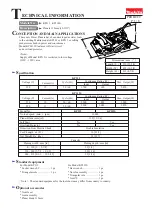
2 | Safety
BÜCHI Labortechnik AG
10/94
Operation Manual ProxiMate™
2.4
Residual risks
The device has been developed and manufactured using the latest technological ad-
vances. Nevertheless, risks to persons, property or the environment can arise if the
device is used incorrectly.
Appropriate warnings in this manual serve to alert the user to these residual dangers.
2.4.1
Glass and acrylic breakage
Broken glass and acrylic can cause severe cuts.
Broken glass or acrylic can enter production.
u
Handle the Petri Dishes and other glass and acrylic components carefully and do
not drop them.
u
Always visually inspect glass and acrylic components for damage every time they
are to be used.
u
Do not continue to use glass and acrylic components that are damaged.
u
Always wear protective gloves when disposing of broken glass and acrylic.
2.4.2
Faults during operation
If a device is damaged, sharp edges or exposed electrical wires can cause injuries.
u
Regularly check device for visible damage.
u
If faults occur, switch off the device immediately and inform the operator.
u
Do not continue to use devices that are damaged.
2.4.3
Instrument damage due to an incorrectly installed IP module
An incorrectly installed IP module can cause material and moisture to enter the instru-
ment.
u
Do not open the IP module.
u
Make sure that the USB sockets are covered when not in use.
2.4.4
Malware infection due to connections with other devices or network
Connections with other devices or a network can cause a malware infection to the in-
strument.
u
Install antivirus software and firewall on the instrument before connecting it to
other devices or network.
2.4.5
Data loss
In the event of a power failure, e.g. due to lightning or interruption of power supply,
measurement data may be lost.
u
Carry out regular data backup.
2.4.6
Damage to the internal memory due to incorrect shutting down of the
instrument
Incorrect shutting down of the instrument can cause damage to the internal memory.
u
Shut down the instrument as described. See Chapter 6 "Operation", page 27
2.5
Personal protective equipment
Depending on the application, hazards due to heat and/or corrosive chemicals may
arise.
u
Always wear appropriate personal protective equipment such as safety goggles,
protective clothing and gloves.
u
Make sure that the personal protective equipment meets the requirements of the
safety data sheets for all chemicals used.











































